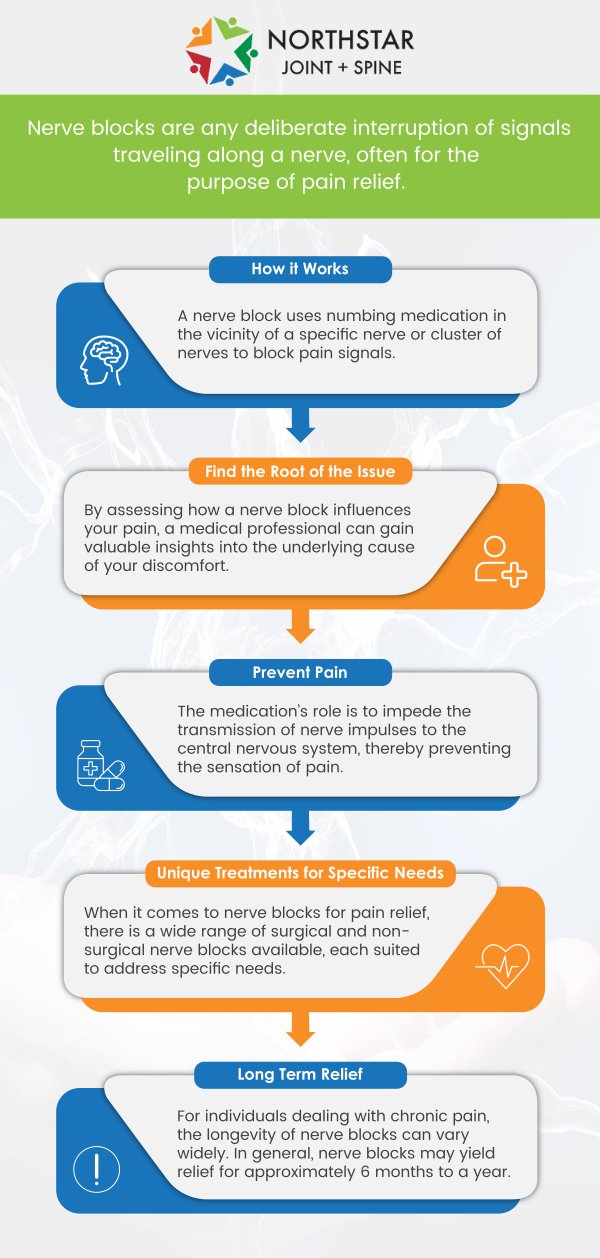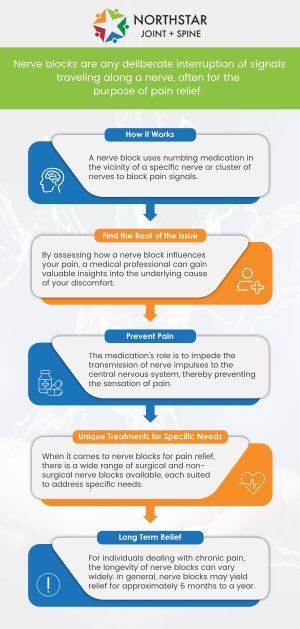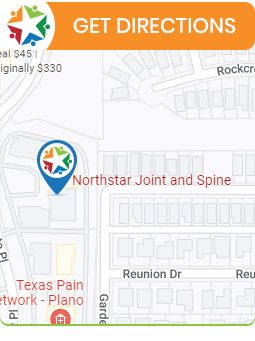Diagnostic Nerve Block Injections Specialist in Plano, TX
Diagnostic nerve block injections help identify the source of pain and guide the selection of the most effective treatment. By pinpointing the exact cause, these injections provide a more targeted approach to pain management. Dr. Robert Nocerini, MD, at Northstar Joint and Spine, offers these injections to assist in diagnosing nerve-related conditions and creating a tailored treatment plan. For more information contact us today or schedule an appointment online. We are conveniently located at 7704 San Jacinto Pl Suite #200 Plano, TX 75024.




Table of Contents:
What are nerve blocks?
How are nerve blocks used?
What are the benefits of nerve blocks?
What can nerve blocks treat?
What are the expected results?
Diagnostic Nerve Block Injections by Board-Certified Dr. Robert J. Nocerini, MD at Northstar Joint and Spine, Plano, TX
The body is complex, with many overlapping structures, and many potential sources of pain. This is one reason why diagnosing and treating the root causes of pain can be so challenging, but also because there are many different causes of pain. Fortunately, there are certain procedures that aid in this process, such as diagnostic nerve blocks. These nerve blocks are specifically used to diagnose the root cause of the pain so that an effective treatment plan can be developed.
Nerve blocks are a type of medication that is used to temporarily block pain signals in the body. They are most commonly used in the lower back to numb the area around the spinal nerve, reducing pain and inflammation. Nerve blocks can also be used to disrupt painful nerve signals in other parts of the body, such as the arms and legs. They are often used together with other medications to provide additional pain relief, but may also be used on their own.
Nerve blocks work by injecting anesthetic or steroid medications into the nerves, which causes them to temporarily stop sending pain signals to the brain. They are most commonly used in the short term to provide immediate pain relief but are often used in conjunction with other long-term pain management methods such as physical therapy, exercise, and lifestyle changes.
There are different kinds of nerve blocks used for various purposes, the two most common being diagnostic nerve blocks and therapeutic nerve blocks.
• Therapeutic Nerve Blocks — Therapeutic nerve blocks are used to treat painful conditions, including arthritis. These nerve blocks contain a local anesthetic, such as lidocaine, that can be used to control acute pain and provide short-term relief.
• Diagnostic Nerve Blocks — Diagnostic nerve blocks are used to determine sources of pain and typically contain an anesthetic that has a predetermined duration of relief.
• Prognostic Nerve Blocks — Prognostic nerve blocks predict the outcomes of a treatment and are commonly used to determine if more permanent treatments (such as surgery or a more invasive procedure) would be successful in relieving pain.
• Preemptive Nerve Blocks — Preemptive nerve blocks are meant to prevent subsequent pain from a procedure and minimize sequelae, such as phantom limb pain.
The benefits of nerve blocks include:
• Can Manage Different Types of Pain — Nerve blocks are used to manage several different kinds of pain, including chronic pain, acute pain, post-surgical pain, and nerve pain.
• Can Provide Immediate Relief — The local anesthetic used in nerve blocks can ease pain nearly instantly.
• Can Achieve Long-Term Relief — Because some injections reduce irritation on the nerves, allowing them time to properly heal, nerve blocks can also offer longer-term relief.
• Improves Function in Day-To-Day Life — Nerve blocks can help people function better in their daily lives, allowing them to exercise, go to work, and do the things they love the most without restrictions from pain.
Nerve blocks are used to treat:
• Labor and delivery pain
• Pain after surgery
• Cancer-related pain
• Arthritis pain
• Severe facial pain, like trigeminal neuralgia
• Low back pain
• Headaches, including migraines and occipital neuralgia
• Chronic regional pain syndrome, or CRPS
Although each patient responds to the treatment differently, pain relief can last anywhere from a few days to several weeks. Some patients may achieve adequate relief from a single injection, while others may need multiple nerve block treatments in order to attain the best results.
Dr. Robert J. Nocerini, MD, a board-certified pain management specialist with over 26 years of clinical experience, offers highly accurate diagnostic nerve block injections in Plano, TX. These targeted procedures are used to identify the exact origin of pain by temporarily numbing specific nerves, providing both diagnostic clarity and symptom relief.
At Northstar Joint and Spine, Dr. Nocerini utilizes advanced imaging guidance to ensure precision, comfort, and safety during every procedure. His vast experience allows him to pinpoint pain sources efficiently and design tailored treatment strategies. Patients across Plano choose Dr. Nocerini for his exceptional diagnostic accuracy and dedication to improving their quality of life through minimally invasive pain management solutions. For more information contact us today or schedule an appointment online. We are conveniently located at 7704 San Jacinto Pl Suite #200 Plano, TX 75024. We look forward to serving you! We serve patients from Plano TX, Willow Bend TX, Frisco TX, Allen TX, Addison TX, North Dallas TX, and surrounding areas.

Check Out Our 5 Star Reviews


Additional Services You May Need
▸ Back Pain
▸ Shoulder Pain
▸ Chronic Pain
▸ Epidural Steroid Injections
▸ Spinal Cord Stimulation
▸ Viscosupplementation
▸ Genicular Nerve Blocks
▸ Facet Injections
▸ Joint Injections
▸ Sacroiliac Joint Injections
▸ Lumbar and Cervical
▸ Facet Medial Branch Blocks
▸ Diagnostic Nerve Blocks
▸ Medication Management
▸ Neck Pain Doctor
▸ Diabetic Peripheral Neuropathy
▸ Headaches
▸ Suboxone
▸ Botox for Migraines
▸ Peripheral Nerve Stimulation
▸ Spine
▸ Joints
▸ Muscles
▸ Bones

Additional Services You May Need
▸ Back Pain
▸ Shoulder Pain
▸ Chronic Pain
▸ Epidural Steroid Injections
▸ Spinal Cord Stimulation
▸ Viscosupplementation
▸ Genicular Nerve Blocks
▸ Facet Injections
▸ Joint Injections
▸ Sacroiliac Joint Injections
▸ Lumbar and Cervical
▸ Facet Medial Branch Blocks
▸ Diagnostic Nerve Blocks
▸ Medication Management
▸ Neck Pain Doctor
▸ Diabetic Peripheral Neuropathy
▸ Headaches
▸ Suboxone
▸ Botox for Migraines
▸ Peripheral Nerve Stimulation
▸ Spine
▸ Joints
▸ Muscles
▸ Bones






